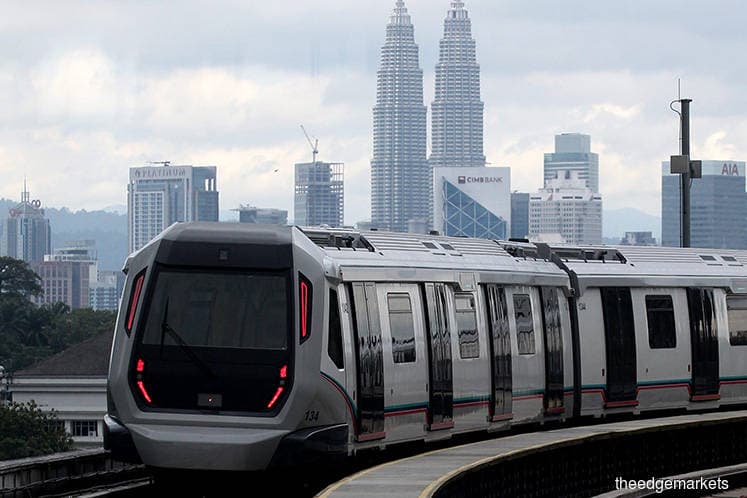
This article first appeared in The Edge Malaysia Weekly on March 12, 2018 - March 18, 2018
TWO consortiums have been shortlisted for the coveted job of constructing the RM45 billion Klang Valley Mass Rapid Transit Line 3 (MRT3).
The candidates are the MMC Corp Bhd-Gamuda Bhd-George Kent Bhd consortium and China Communications Construction Company Ltd-China Communications Construction Company (M) Sdn Bhd joint venture (CCCCJV), sources say.
According to a source privy to the matter, Prime Minister Datuk Seri Najib Razak chaired a high-level meeting last Monday to discuss the awarding of the contract. Both consortiums were chosen based on their technical capabilities.
“MMC-Gamuda-GK and CCCCJV were shortlisted because of their technical capabilities, which met the technical requirements outlined by MRT Corp,” says the source. “The financing rate was also a consideration but it was not a deal breaker. The government placed higher weightage on technical capabilities and tunnelling experience.”
The MRT3, or Circle Line, will be completely underground, running through high-density areas in central Kuala Lumpur. The government approved the project on Oct 30 last year, and a briefing for the turnkey project contractor was held on Nov 15.
On Jan 19, Mass Rapid Transit Corp Sdn Bhd announced that four consortiums had submitted bids for the turnkey contractor role.
Besides MMC-Gamuda-GK and CCCCJV, the other candidates were the Sapura Group-Top International Engineering Corp (TIEC) and Pacific Construction Group Company Ltd- Mudajaya Group Bhd-Jaycorp Engineering and Construction Sdn Bhd (JEC) consortiums.
According to another source, Sapura-TIEC had the lowest financing rate of all the candidates, at 2.3% per annum, funded by a consortium of Chinese banks. MMC-Gamuda-GK offered a financing rate of 4.7%, while CCCCJV had secured financing at a rate of 5% per annum.
However, Sapura-TIEC was not shortlisted for the turnkey contractor role because their technical partner, Samsung C&T Corp, had yet to complete the Riyadh Metro project in Saudi Arabia.
Samsung C&T is part of a consortium led by Spanish construction group FCC and Alstom, which is building Lines 4, 5 and 6 of the Riyadh Metro. The total length of the three lines is 64.6km, with 26.6km running underground.
While Samsung C&T is not part of the Sapura-TIEC consortium, it has been named as the technical partner, as Sapura and TIEC do not have the technical capability and tunnelling experience, says the source.
TIEC is a civil engineering company owned by the Shaanxi provincial government. It was involved in the construction of the Xi’an Metro station and other public, industrial and commercial buildings in China, Asia-Pacific, South America and Africa.
“The government was being really technical with the requirements, which disqualified Sapura-TIEC and possibly Pacific-Mudajaya-JEC. Only the two shortlisted consortiums met the technical requirements, despite their financial rate being high,” says the source.
The technical requirements listed by MRT Corp stated, among other things, that the tenderer must have successfully completed civil works for either two urban metro projects worth at least RM5 billion each or one project worth at least RM10 billion on a design and build or turnkey basis.
MMC-Gamuda-GK will be funded by borrowings from local banks led by CIMB Investment Bank Bhd, to be raised by DanaInfra Nasional Bhd, says the source. CCCCJV will be funded by Chinese banks through US dollar-denominated debt, the source adds.
While the turnkey contractor role is supposed to go to only one consortium or JV, the source says the prime minister asked MRT Corp to see whether MMC-Gamuda-GK and CCCCJV could share the job.
“The PM asked MRT Corp to see whether there is a possibility, not that he wants both candidates to get the job. The contract value of RM45 billion is very big and this is a crucial project, so he doesn’t want it to be delayed or run into problems,” says the source.
Having two main contractors for a single project has been done before in Malaysia with the construction of the Petronas Twin Towers. Hazama Corp of Japan and Samsung C&T each built one of the towers.
And even though it has not been shortlisted, Sapura could still benefit from the MRT3 contract because its expertise in communications technology could give it a head start for the communications package of the line, say observers.
“If the government is serious about developing local expertise, capable local companies should be given opportunities to take part in large infrastructure projects such as this,” says an observer.
Save by subscribing to us for your print and/or digital copy.
P/S: The Edge is also available on Apple's AppStore and Androids' Google Play.